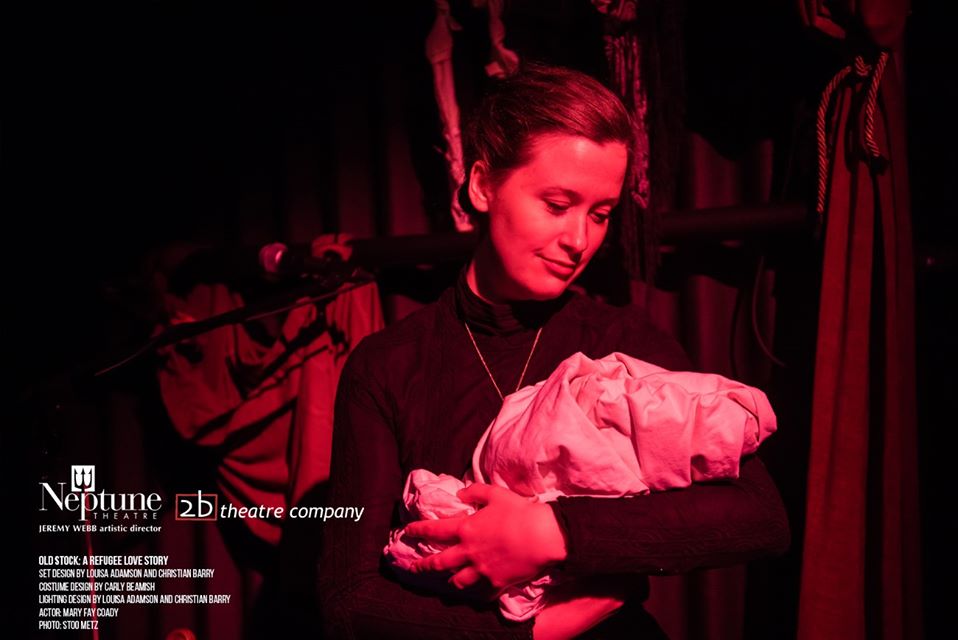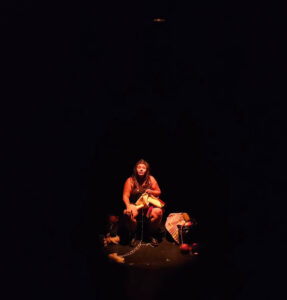
Two years ago when I first saw 2b Theatre’s Old Stock: A Refugee Love Story at the Waiting Room Theatre (RIP) on Almon Street I knew I had witnessed something incredibly special. From the moment Neptune Theatre announced that they were bringing the show to the Scotiabank Studio Theatre, after it had toured the world, ran Off-Broadway, was nominated for six Drama Desk Awards, and won the Lieutenant Governor of Nova Scotia Masterworks Arts Award, I knew I needed to see the show again (and again, and again). It is truly a beautifully unique, heartbreaking, joyous, triumphant, wise, and funny piece of theatre that speaks to a Canadian experience that has found resonance all over the world.
The show was created by Hannah Moscovitch, Ben Caplan and Christian Barry and tells a story based on Moscovitch’s great grandparents Chaya Yankovitch and Chaim Moscovitch, who arrived at Pier 21 in the first decade of the Twentieth Century, fleeing violence and death, and hoping that Canada might offer them a peaceful future. Old Stock: A Refugee Love Story begins with Chaya and Chaim first meeting in an immigration line in Halifax, both hoping they won’t be diagnosed with an infectious disease that might inhibit their new lives.
Chaim is played by Eric Da Costa, he is young, idealistic, and immediately enraptured by Chaya. Chaya, played by Mary Fay Coady, is reserved, unsure, and actively mourning the loss of a happy life in Romania. Against the odds, in Montréal, they get to know one another a little bit and form a tentative partnership in marriage. Throughout the play we see Chaim and Chaya work toward making a good life for themselves, both here in Canada, and together with one another, and we see both the personal and the societal obstacles that make happiness difficult to come by, but not impossible. Da Costa is as beautifully exuberant and vulnerable as Chaim as Coady is biting, reticent, and cynical in her world-weariness. Watching the ways they continually try to connect with one another is deeply poignant.
Ben Caplan plays The Wanderer, the show’s narrator, whose job it is to provide the audience with cultural, historical, and theatrical context through contemporary Klezmer-style music. Klezmer is Jewish folk music, often played on joyous occasions, such as weddings. Caplan is boisterous and mischievous and hops around the stage with unbridled energy and true joie de vivre painting the vivid and complex tableaus of Chaim and Chaya’s traditions, personal histories, and the worlds they have left behind. He also tells us about the devastating pogroms (violent attacks, riots, and massacres of Jews in the Russian Empire in the 19th and 20th Century) that Chaim and Chaya were fleeing, and about the more subtle, but still indefensible, anti-Semitism that they encountered in Canada. In fact, as the title suggests, the music references “Old Stock Canadians” and “barbaric cultural practices,” both phrases that were in the news during the 2015 Canadian Election, shortly before this play was written. This shows how Canada can still simultaneously be both a safe place for refugees to come, and also a problematic one.
Caplan is joined by Da Costa (Woodwinds) and Coady (Violin), as well as Jeff Kingsbury (Drums) and Kelsey McNulty (Keyboards and Accordion) in creating the rich musical score. The lyrics of the songs both help to tell this story, but also comment on it. They provide much of the show’s lightheartedness and humour, often focusing on the more carnal aspects of the tale, but they also encourage the audience to look deeper and more critically, and to resist the urge to see Canada purely as a hero in this story. Musically, the score is largely jubilant and joyful in a way that is beautifully infectious. Then, in the more somber and more reverential moments, Caplan deftly channels the same intensity and emotion from raucous to gentle, bringing the audience (their hearts in their mouths) along seamlessly.
The ultimate triumph in Old Stock: A Refugee Love Story is Elijah, the young son of Moscovitch and Barry, who represents the newest generation born because of the survival, despite the odds, of his ancestors. This is a theme that can resonate beautifully with those from every marginalized community, whose children represent survival in the face of genocide. I would also say Old Stock: A Refugee Love Story is a powerful gift that Moscovitch and Barry have given to their son, a gift and a responsibility, that he never forget Chaim and Chaya and how their families suffered, and all the love and the heartbreak and the violence and the determination and the courage that have led to him being Elijah Julian Moscovitch Barry. I think if we had all been given this same gift, the chance to deeply understand and to honestly empathize with our ancestors, we might have more genuine empathy and understanding for others in similar situations. Perhaps this would even mean fewer instances where people are forced to become refugees in the first place.
Old Stock: A Refugee Love Story plays at Neptune Theatre’s Scotiabank Studio (1593 Argyle Street, Halifax) Tuesdays-Sundays at 7:30pm, with 2:00pm shows on Saturdays and Sundays. It has been EXTENDED until November 23rd, 2019. Ticket availability is limited. You can book tickets in person at the Box Office at 1593 Argyle Street, by phone 902.429.7070 or ONLINE HERE.
You can follow Neptune Theatre on Social Media: Facebook. Twitter. Instagram (@NeptuneTheatre). You can follow 2b Theatre on Social Media. Facebook. Twitter. Instagram (@2bTheatre). Join the Conversation Online by using #HFXOldStock.






